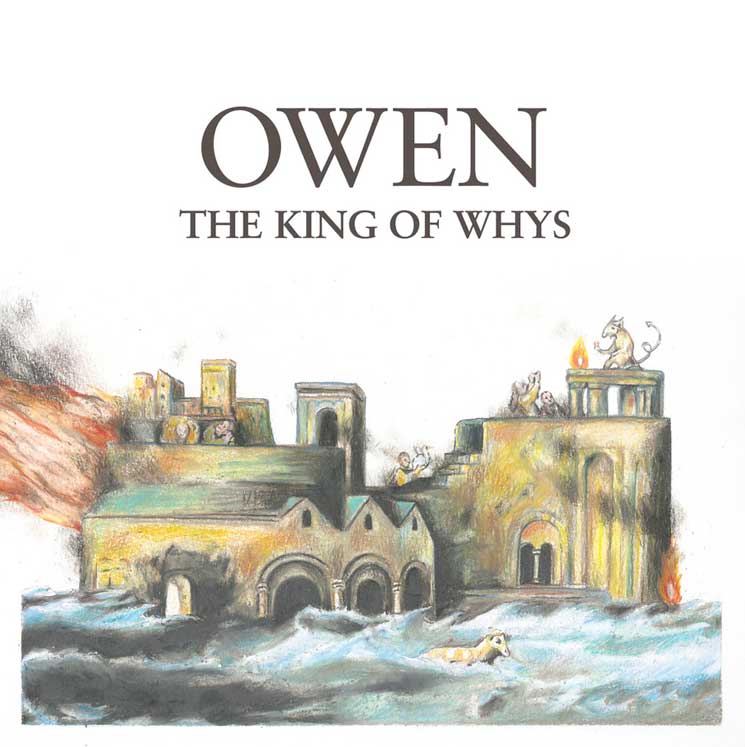Over the course of 15 years, prolific Chicago indie musician Mike Kinsella has logged several quality albums of contemplative and soft-spoken indie-folk for his solo project Owen, all from the comfort of home. Until now, the moniker has barely demanded Kinsella leave his bedroom to record, and while the albums have gradually become fuller and more detailed in that setting, the 39-year-old must have sensed that it was finally time for a change of scenery.
In fact, The King of Whys is the first work in his career to be recorded entirely outside the greater Chicago area. This one took him not too far out to April Base Studios in Eau Claire, Wisconsin, the studio and hometown of Justin Vernon, to work with producer S. Carey, a frequent collaborator with Bon Iver and Sufjan Stevens. And just as Bon Iver exploded creatively between For Emma, Forever Ago, an album recorded by a sad, lonely man in a cabin in the woods, and the grand, lushly arranged Bon Iver, Bon Iver, Owen's latest takes the gentle acoustic guitar and plaintive melodies that have long defined him to fascinating new places.
Here, with the help of studio instrumentalists whose resumés include experience with Bon Iver and fellow folk heavyweight the Tallest Man on Earth, Kinsella lets his ideas flow outward in all manner of directions, rather than confining himself to a relatively tiny sonic space. Of note is The King of Whys' dynamic range, like the contrast between pounding verses and ethereal choruses on "Empty Bottle." There's a wealth of sonic diversity here, from the plinking pianos and weepy orchestral arrangements on the melancholy "The Desperate," to the fluttering guitars and angelic hums on the serene "Lovers Come and Go," to the upbeat, campfire twang of "A Burning Soul," to the plucky violins of the folksy, determined "Lost."
The King of Whys is wrought with restless artistry, simultaneously looking for and finding emotional release through musical exploration, lyrical introspection and bits of dry humour. Kinsella's thoughts and experiences have obviously changed significantly since the days of Cap'n Jazz, American Football and earlier solo releases, but the feeling remains intact and authentic many years later.
As he gets older, Kinsella is looking deeper inward while venturing further outward — a wonderful and promising blueprint that suggests Owen will age finely.
(Polyvinyl)In fact, The King of Whys is the first work in his career to be recorded entirely outside the greater Chicago area. This one took him not too far out to April Base Studios in Eau Claire, Wisconsin, the studio and hometown of Justin Vernon, to work with producer S. Carey, a frequent collaborator with Bon Iver and Sufjan Stevens. And just as Bon Iver exploded creatively between For Emma, Forever Ago, an album recorded by a sad, lonely man in a cabin in the woods, and the grand, lushly arranged Bon Iver, Bon Iver, Owen's latest takes the gentle acoustic guitar and plaintive melodies that have long defined him to fascinating new places.
Here, with the help of studio instrumentalists whose resumés include experience with Bon Iver and fellow folk heavyweight the Tallest Man on Earth, Kinsella lets his ideas flow outward in all manner of directions, rather than confining himself to a relatively tiny sonic space. Of note is The King of Whys' dynamic range, like the contrast between pounding verses and ethereal choruses on "Empty Bottle." There's a wealth of sonic diversity here, from the plinking pianos and weepy orchestral arrangements on the melancholy "The Desperate," to the fluttering guitars and angelic hums on the serene "Lovers Come and Go," to the upbeat, campfire twang of "A Burning Soul," to the plucky violins of the folksy, determined "Lost."
The King of Whys is wrought with restless artistry, simultaneously looking for and finding emotional release through musical exploration, lyrical introspection and bits of dry humour. Kinsella's thoughts and experiences have obviously changed significantly since the days of Cap'n Jazz, American Football and earlier solo releases, but the feeling remains intact and authentic many years later.
As he gets older, Kinsella is looking deeper inward while venturing further outward — a wonderful and promising blueprint that suggests Owen will age finely.




